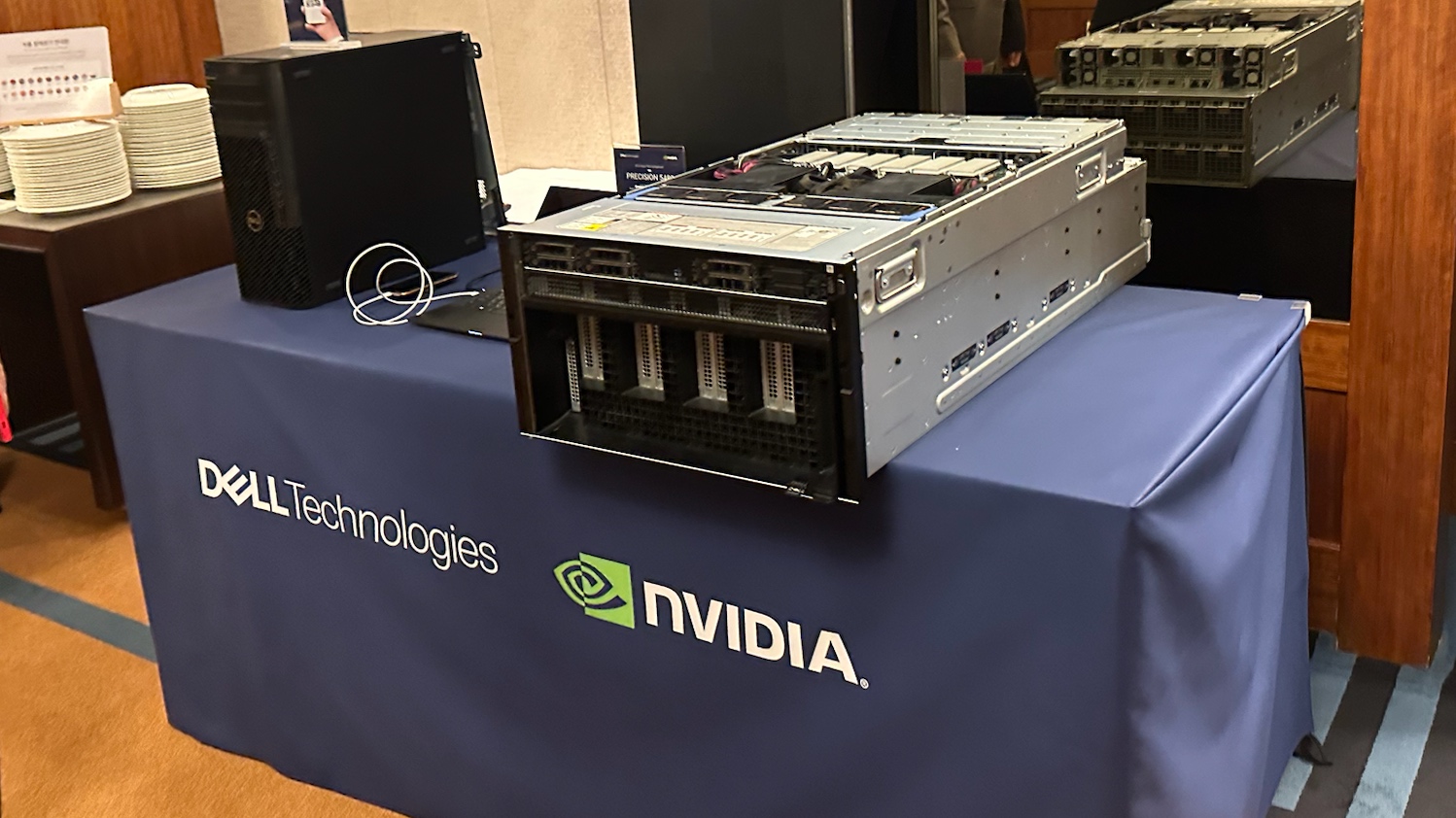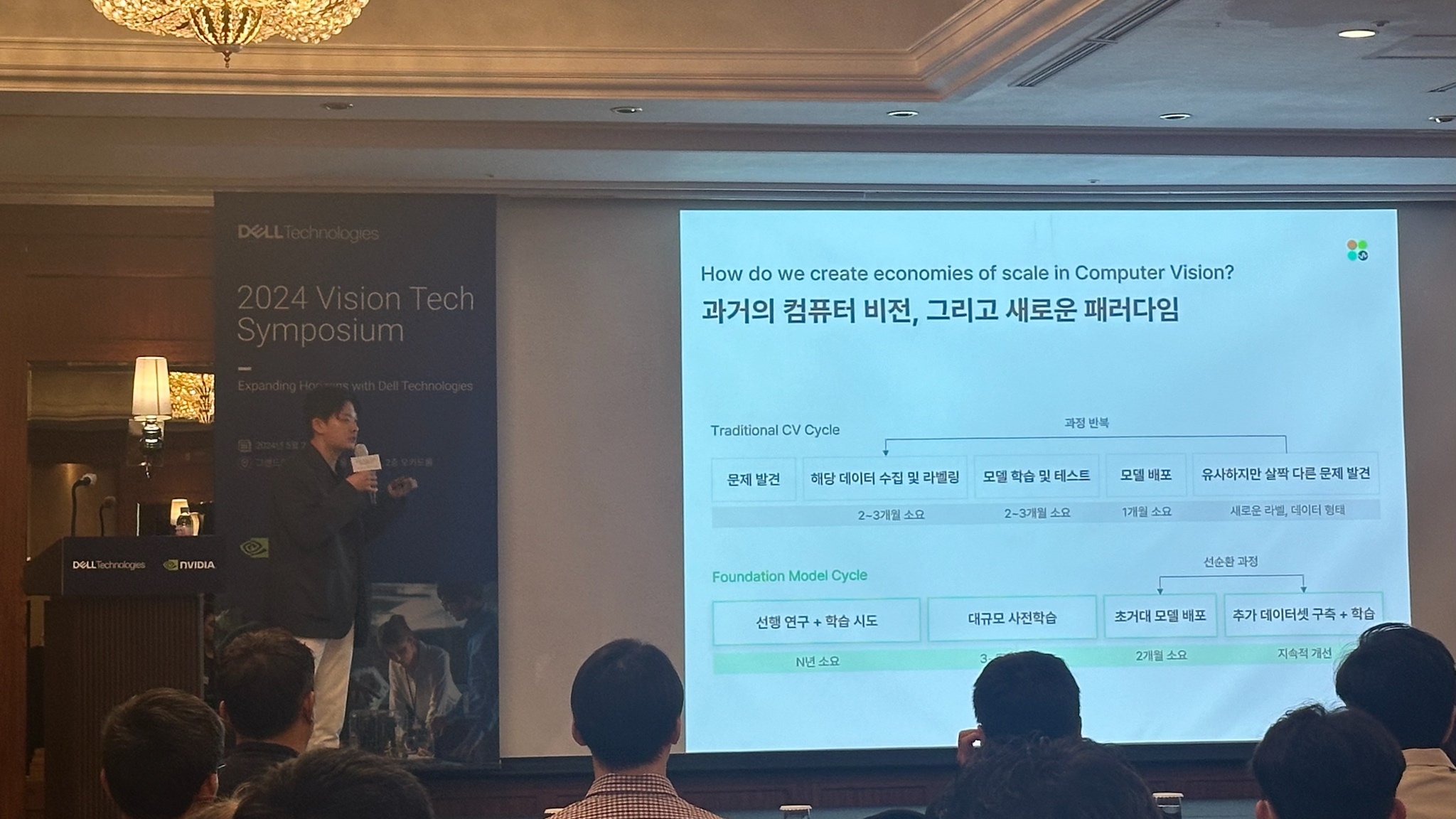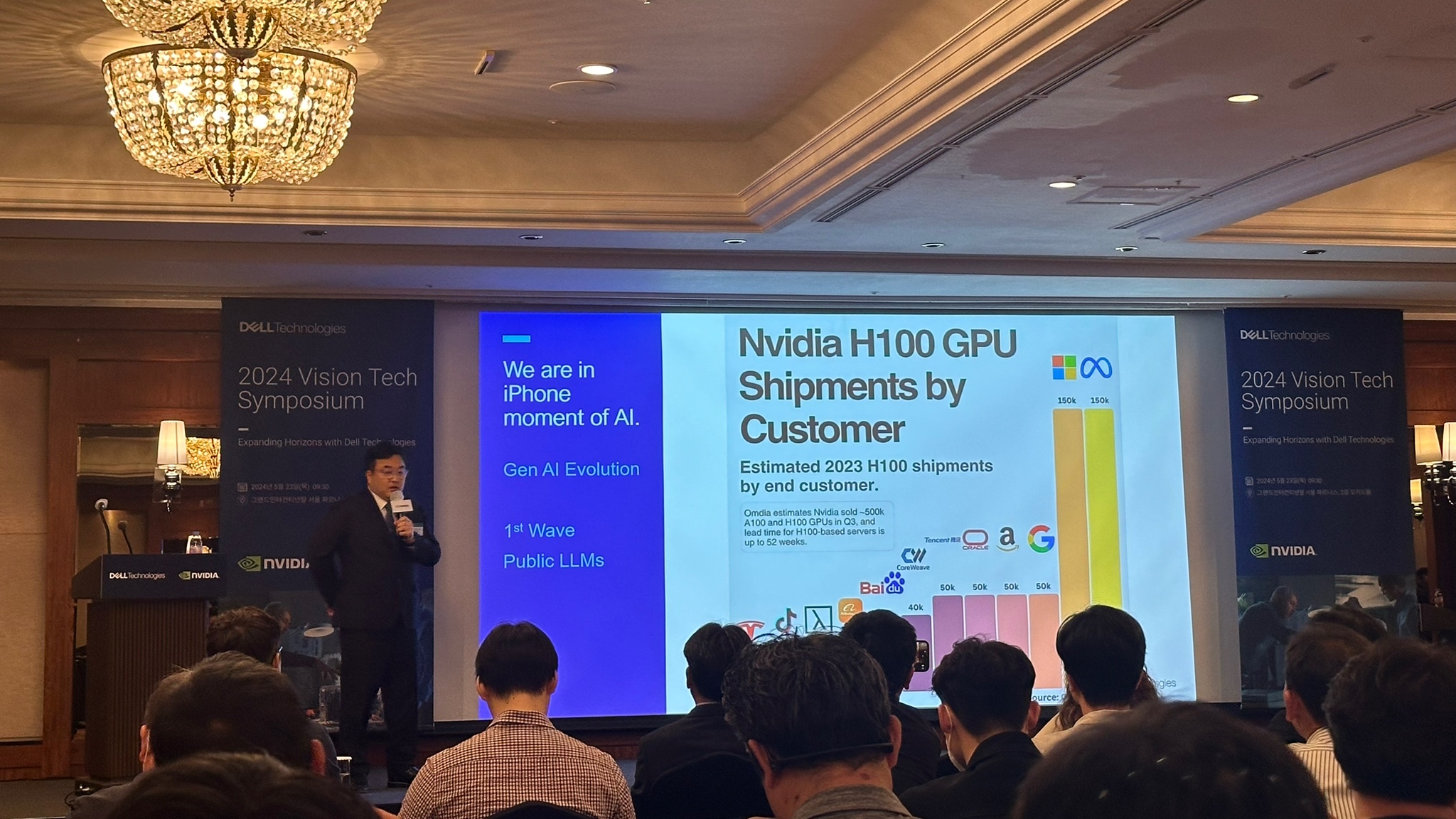델 테크놀로지스(Dell Technologies)는 23(목) 그랜드 인터컨티넨탈 서울파르나스에서 '2024 델테크놀로지스 Vision Tech 산업 심포지엄'을 개최했다고 밝혔다.
23일 엔비디아 컴퓨터 비전 심포지엄 2024 개최
생성형 AI 영상·제조·유통분야 적용 사례 소개
엔비디아 블랙웰 GPU 서버 2024년 하반기 출시
델 테크놀로지스가 엔디비아와 손잡고 다양한 산업분야에서 생성형 AI 도입을 지원하는 컴퓨팅 인프라를 제공한다.
델 테크놀로지스(Dell Technologies)는 23(목) 그랜드 인터컨티넨탈 서울파르나스에서 '2024 델테크놀로지스 Vision Tech 산업 심포지엄'을 개최했다고 밝혔다. 이날 행사에서는 델과 엔비디아가 함께 제공하는 AI 포트폴리오가 금융, 제조, 유통, 영상, 공공안전 등 분야에서 적용되는 현주소와 전망이 다뤄졌다.
■ 델, 클라우드부터 엣지까지 AI 구축 지원

델 테크놀로지스는 최근 엔비디아와의 협력을 확대하며 '엔비디아 기반 델 AI 팩토리(Dell AI Factory with NVIDIA)'에 새로운 서버, 엣지, 워크스테이션, 솔루션, 서비스 등을 추가해 신속한 AI 도입을 지원한다고 밝힌 바 있다.
'엔비디아 기반 델 AI 팩토리'는 델의 AI 포트폴리오를 '엔비디아 AI 엔터프라이즈' 소프트웨어 플랫폼과 통합한 오퍼링이다. 엔비디아 텐서 코어 GPU 등 기술을 기반으로 한다.
특히 델이 공개한 신제품 '델 파워엣지 XE9680L'은 기존 대비 더 작은 4U 폼팩터와 8개 엔비디아 블랙웰 아키텍처 GPU를 탑재해 높은 성능을 제공할 것으로 기대되고 있다. 해당 제품은 기존 모델 대비 노드당 33% 더 높은 GPU 집적도를 제공한다. 델 파워엣지 XE9680L 서버는 2024년 하반기 중 출시될 예정이다.
델은 클라우드부터 엣지 단까지의 환경 전반에서 AI 구축을 지원할 수 있다는 점을 강조한다. 21일 델은 퀄컴 스냅드래곤 X 엘리트 및 스냅드래곤 X 플러스 프로세서를 기반으로 마이크로소프트(MS) AI 경험을 제공하는 신제품 코파일럿+PC 제품군을 공개했다. 델은 "이번 제품으로 사용자는 GPU, CPU, NPU 전반에 걸친 로컬 컴퓨팅 및 프로세싱을 기반으로 혁신적 PC 환경을 경험할 수 있을 것"이라고 말했다.
이날 행사에서 델 정용 이사는 "코파일럿+PC 제품군은 챗GPT가 PC의 모든 어플리케이션에서 구동되는 AI PC로, 개인 PC부터 향후 B2B 제품군으로 확장하며 더욱 강력한 성능을 발휘할 것"이라고 소개했다.
또한 "모든 데이터센터는 AI의 속도와 규모를 다룰 수 있도록 설계돼야 하며, 델의 포트폴리오와 파트너 생태계를 통해 온프레미스와 엣지, 클라우드 환경 전반에서 완벽하게 제어할 수 있는 AI 구축을 지원한다"고 덧붙였다. 예컨대 삼성SDS는 델과의 협력으로 델 파워엣지 XE9680를 공급받아 생성형 AI를 온프레미스로 구현했다.
■ 각 산업에 스며든 생성형 AI

이날 행사에는 각 분야의 전문가가 양사가 제공하는 솔루션의 적용 사례를 소개했다. 주요 연사로는 △H20 권병희 상무 △가우스랩스 최병원 부사장 △리더스시스템즈 차정호 상무 △이마트 정유선 담당 △트웰브랩스 정진우 이사 △엔비디아 김창민 전무가 참여했다.
델과 엔비디아의 협력은 전 세계 다양한 산업군에 컴퓨팅, 네트워킹, 소프트웨어를 포함한 풀스택 오퍼링을 제공한다. 엔비디아 젠슨 황 CEO는 "고객이 코파일럿, 코딩 어시스턴트, 가상 고객 서비스 에이전트, 산업용 디지털 트윈 등을 구축할 수 있도록 지원할 계획"이라고 말한 바 있다.
오픈소스 AI 민주화를 표방하는 H2O.ai 권병희 상무는 "머신러닝과 AI 비전을 활용해 예측 품질 관리 및 디지털 트윈 기반의 공정 최적화를 달성했다"고 전했다. H2O.ai의 솔루션은 글로벌 제조업체에게 공급망 재고수준 수요예측, 예측 정비 관리 등을 가능케한다.
예컨대 H2O.ai의 고객사 '페트로나스'는 1분에 1만 7천개의 기계 센서 데이터를 AI 기반으로 수집 및 분석해 오일 및 가스 장비 고장을 예측했다. 또한 반도체 제조사 NXP는 H2O.ai의 솔루션을 통해 완전 자동화 엔지니어링을 달성했다. LG화학은 배터리 수명에 영향을 미치는 요인을 파악, 다양한 디바이스에서 배터리 잔존 수명예측 모델을 생성했다.
'트웰브랩스(Twelve Labs)'는 사람처럼 영상을 이해하는 멀티모달 AI를 소개했다. 트웰브랩스는 영상언어 생성 모델 '페가수스(Pegasus-1)'와 멀티모달 영상이해 모델 '마렝고(Marengo 2.6)'를 보유하고 있다.
트웰브랩스 정진우 이사는 "그 동안 컴퓨터 비전이 확산되기 어려웠던 이유는 영상은 굉장히 복잡한 멀티모달 데이터로, 기존의 비전 AI는 영상 분석에 한계점을 가졌기 때문이다"며, "트웰브랩스는 차세대 비전 AI인 초거대 멀티모달 영상언어모델을 만들어 AI가 영상을 이해할 수 있도록 텍스트, 유사 이미지, 영상을 기반으로 검색이 가능해졌다"고 말했다.
트웰브랩스는 마렝고와 페가수스를 기반으로 하는 플랫폼을 통해 지능형 영상 시스템을 구축했다. 영상을 kb 단위의 벡터로 추출해 다양한 작업이 가능케 했으며, 지난 3월 기준 가장 유망한 영상 이해 모델로 인정받고 있다.
영상언어모델은 공공안전, 미디어 콘텐츠, 스포츠, 국방 등 분야에서 다양하게 활용될 수 있다. 예컨대 바디캠 OEM 제공사는 200PB 규모의 데이터를 스토리지에 보관해 분석에 많은 시간이 소요됐지만, 영상 AI를 활용하면 원하는 장면을 빠르게 찾을 수 있다.


